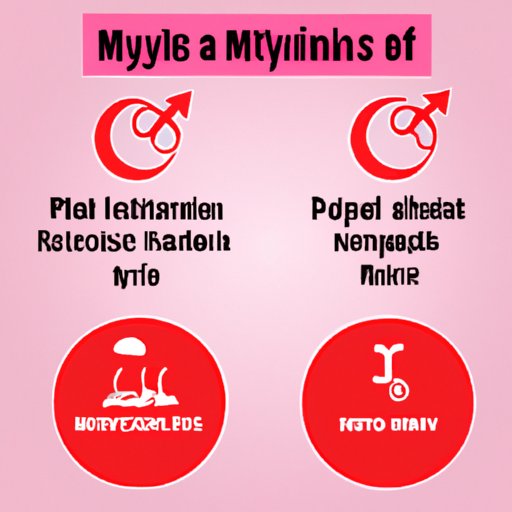
Introduction
Whether you’re trying to get pregnant or trying to avoid it, understanding the factors that affect fertility is crucial. One question that comes up frequently is whether or not it’s possible to get pregnant while on your period. In this article, we dive into the myths and facts surrounding pregnancy during menstruation to give you a comprehensive understanding of your reproductive health.
Debunking the Myths: Can You Really Get Pregnant While On Your Period?
There are many common misconceptions about pregnancy during menstruation, including the belief that it’s impossible to get pregnant while on your period. However, this is not entirely true. While the likelihood is lower, it is still possible for pregnancy to occur during this time.
One reason why some people believe you can get pregnant on your period is due to the variability of menstrual cycles. Menstrual cycles can range in length, and ovulation can occur earlier or later than expected. Additionally, sperm can live inside the body for up to five days, which means that if you have a shorter cycle and ovulate soon after your period ends, the sperm could still be viable and result in pregnancy.
However, the truth is that pregnancy during menstruation is uncommon. Hormonal changes during menstruation make it difficult for sperm to survive and reach the egg. In most cases, it is highly unlikely to get pregnant while on your period.
The Truth About Fertility: Understanding Your Chances of Getting Pregnant During Menstruation
To understand the likelihood of getting pregnant during menstruation, it’s important to understand the menstrual cycle and ovulation. The menstrual cycle typically lasts around 28 days, although it can vary from 21 to 40 days. Ovulation occurs approximately 14 days before the start of the next menstrual period, give or take a few days depending on the length of your cycle.
This means that if you have a shorter cycle, ovulation could occur soon after your period ends. If you have a longer cycle, it may occur closer to the middle of your cycle. The most fertile days of your cycle are the two days leading up to ovulation and the day of ovulation itself.
During menstruation, the uterus sheds its lining, making it difficult for fertilization to occur. However, if bleeding is light and ovulation occurs soon after, there is still a small chance of pregnancy.
Exploring the Science: How Hormones Affect Fertility During Your Period
Hormones play a crucial role in the menstrual cycle and ovulation. Follicle-stimulating hormone (FSH) and luteinizing hormone (LH) work together to signal the ovaries to produce estrogen and prepare for ovulation. Estrogen triggers the thickening of the uterine lining, preparing it for fertilization.
During menstruation, levels of estrogen and progesterone are at their lowest. This makes it difficult for sperm to survive and fertilize an egg. However, if ovulation occurs soon after menstruation, estrogen levels will begin to rise again, creating a more hospitable environment for sperm and fertilization.
The Risks and Benefits: Pros and Cons of Attempting to Conceive During Your Menstrual Cycle
While pregnancy during menstruation is unlikely, some people may choose to try to conceive during their period for various reasons. However, there are risks associated with this method. Intercourse during menstruation can increase the risk of infection, and the chances of conception are relatively low.
On the other hand, attempting to conceive during your period may come with potential benefits. Some studies have shown that certain factors, such as an increase in follicle-stimulating hormone, can result in a higher likelihood of conceiving twins.
Can You Get Pregnant on Your Period? A Closer Look at Common Misconceptions
There are many myths surrounding pregnancy during menstruation, such as the belief that you cannot get pregnant at all during this time. However, as we’ve discussed, pregnancy can occur in rare cases. Other myths include the belief that birth control is unnecessary during menstruation, or that douching after intercourse can prevent pregnancy.
It’s important to debunk these myths to avoid unintended pregnancy and take control of your reproductive health. Making informed choices and using reliable methods of birth control can help safeguard against unwanted pregnancy and sexually transmitted infections.
Navigating Your Reproductive Health: Tips on How to Reduce Pregnancy Risks During Your Menstrual Cycle
Reducing the risk of pregnancy during menstruation can be achieved through various methods. Using reliable birth control methods such as the pill, condoms, or an IUD can significantly reduce the chance of unintended pregnancy. Additionally, tracking your menstrual cycle and timing intercourse around your most fertile days, which are typically around ovulation, can increase your chances of conception if you’re trying to get pregnant.
Practicing safe sex and using protection consistently can help lower your risk of sexually transmitted infections. Maintaining good hygiene, such as changing tampons and pads frequently and washing your genitals regularly, can also help reduce the risk of infection.
Conclusion
While pregnancy during menstruation is unlikely, it is still possible. Understanding the menstrual cycle and fertility can help you make informed choices about your reproductive health. It’s important to debunk common myths and take steps to prevent unintended pregnancy and sexually transmitted infections. By prioritizing your reproductive health and using reliable methods of birth control, you can take control of your fertility and make choices that are right for you.




